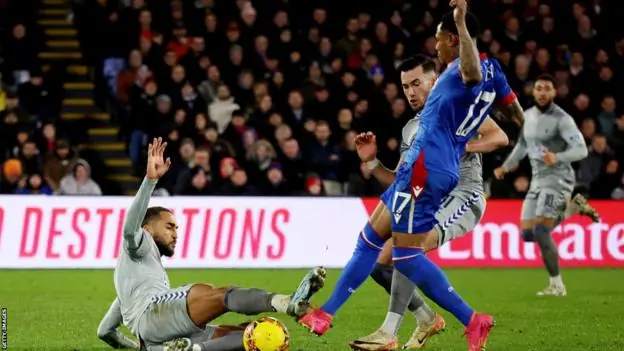Everton Boss Frustrated with VAR Decision in Calvert-Lewin’s Red Card Incident
In a fiery FA Cup clash between Crystal Palace and Everton, controversy erupted when striker Dominic Calvert-Lewin was shown a red card after an altercation with Nathaniel Clyne.
The incident occurred during the third-round draw at Selhurst Park, which ended in a goalless stalemate. It was the first time that the 26-year-old had been sent off in his career.
However, Everton boss Sean Dyche expressed his frustration with the video assistant referee (VAR) decision to use the pitchside monitor during this incident.
Dyche argued that slow-motion replays can distort the true nature of challenges, leading to incorrect judgments being made by officials on the field.
“The slow motion shows a different picture,” Dyche said. “If you want to slow-mo everything, you have to slow-mo everything. There’s minor contact and in live time he doesn’t give anything.”
Referee Chris Kavanagh initially did not take any action but decided to review the incident on the monitor following intervention from VAR Michael Salisbury. Eventually, Calvert-Lewin received his marching orders in the 79th minute.
This decision now leaves Calvert-Lewin facing a three-game ban and puts Everton under pressure as they await their replay against Crystal Palace at Goodison Park later this month.
Dyche expressed his doubts regarding the purpose of the pitchside monitor, indicating that its usage has become predictable and rarely leads to overturned decisions.
“Every fan must be going ‘what is the point?’ We all know the outcome, they are going to agree with everything they’re being told,” Dyche added. “The chance of having something turned over is minuscule so why even bother?”
Everton captain Seamus Coleman echoed his manager’s frustrations, highlighting how slow-motion replays can make challenges appear worse than they actually were.
“When you slow it down it is obviously going to look bad. From where I was it was a good tackle,” Coleman said. “As soon as the ref goes over there [to the screen] you know he’s going to give a red card.”
Crystal Palace manager Roy Hodgson acknowledged that this incident reflects modern-day football standards but hinted at how such challenges would not have resulted in dismissals in previous eras.
“Lots of people who played in the past watching that will say that’s not a red card, but people playing recently will probably say it is a red card because of the way the studs were up and he was leading with a straight leg,” Hodgson commented.
The debate surrounding VAR continues to divide opinions among players and pundits alike. Leicester City defender Conor Coady criticized referees for being too reliant on VAR and suggested sticking with initial decisions made on-field rather than changing them after viewing replays.
The sentiment is shared by former Crystal Palace midfielder Jobi McAnuff, who believes minimal contact incidents are blown out of proportion through excessive reliance on technology.
Conclusion
The controversy surrounding Dominic Calvert-Lewin’s red card during Everton’s FA Cup clash against Crystal Palace highlights ongoing frustrations with VAR. The use of slow-motion replays and pitchside monitors has created a sense of predictability, as decisions rarely get overturned. Both managers and players have voiced their concerns about the impact these technologies have on game outcomes. As calls for improvement persist, football authorities must find ways to strike a balance between ensuring fair play and preserving the fluidity of the beautiful game.
